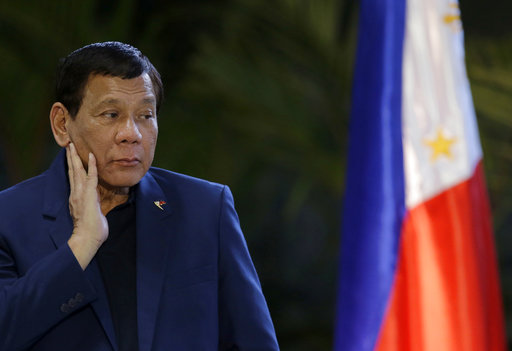
Philippine President Rodrigo Duterte listens to questions from reporters as he arrives at Manila’s international airport, Philippines, Wednesday, May 24, 2017. Duterte warned Wednesday that he’ll be harsh in enforcing martial law in his country’s south as he abruptly left Moscow to deal with a crisis at home sparked by a Muslim extremist siege on a city, where militants burned buildings overnight and are feared to have taken hostages. AP Photo/Aaron Favila
President Duterte’s declaration of martial law in Mindanao to address a supposed terrorist threat has given the military a massive responsibility to continue to preserve the country’s democracy and ensure that people’s rights would be upheld despite restrictions that could be imposed.
“The Armed Forces of the Philippines has been the only guarantee of the country and the people against an unjustified declaration of martial law, or worse a revolutionary government. In fact, the AFP enjoys broad trust and support from the people. How they will proceed from hereon will be crucial for our democracy,” security analyst, Ashley Acedillo, said.
Acedillo, a former Magdalo partylist representative and Air Force pilot, urged people not to allow their “fear to take over and surrender vigilance to the false sense of security that a martial law declaration brings.”
“Once we do so, we may soon realize that the cure is worse than the disease. By the time we find out that something is amiss, it is already too late. We cannot afford to be wrong again,” he said.
Acedillo described President Duterte’s martial law declaration as “very controversial” because Mr. Duterte “is not particularly known for his democratic tendencies, but rather for his populist, quick-fix, strongman approaches.”
Another security expert, Chester Cabalza, also sounded the need for vigilance as soon as martial law takes effect, noting “it should not be abused whenever mishandled conflicts arise against the government.”
“Its context and extent should be clarified to the public to cast doubts of fear and reliving the ghost of yesteryears when martial was abused,” Cabalza said.
Cabalza stressed the need for legal instrumentalities “and the President’s accountability.”
Prominent human rights lawyer Jose Manuel Diokno told the Inquirer by phone that the Free Legal Assistance Group (FLAG), of which he is national chairman, “is monitoring the situation very closely.”
“We want to ensure that the legal and constitutional limitations are respected,” Diokno said.
Military sources told the Inquirer that martial law could help in addressing the terror threat but they are divided on whether or not the entire Mindanao should be included.
One source, speaking on condition of anonymity, said that the security sector’s immediate areas of concern are Sarangani province, the Lanao areas, and the Autonomous Region in Muslim Mindanao (ARMM).
“Perhaps putting the entire Mindanao under martial law is a strategy to show people that government is not singling out any province,” the source, a mid-level officer, said.
A recently retired military intelligence officer said that martial law might finally be the tool to help security forces go after suspected terrorists, agreeing with the President that it should be imposed throughout Mindanao.
The source also said that having a “trust worthy” martial law administrator would help ease concerns over the possibility of abuses under martial rule.
Mr. Duterte named AFP chief of staff General Eduardo Año as the martial law administrator, extending the military chief’s term for another six months.
Año was supposed to retire on June 1 and would have been replaced by Eastern Mindanao Command (Eastmincom) Commander Lt. Gen. Rey Leonardo Guerrero./ac
RELATED VIDEO